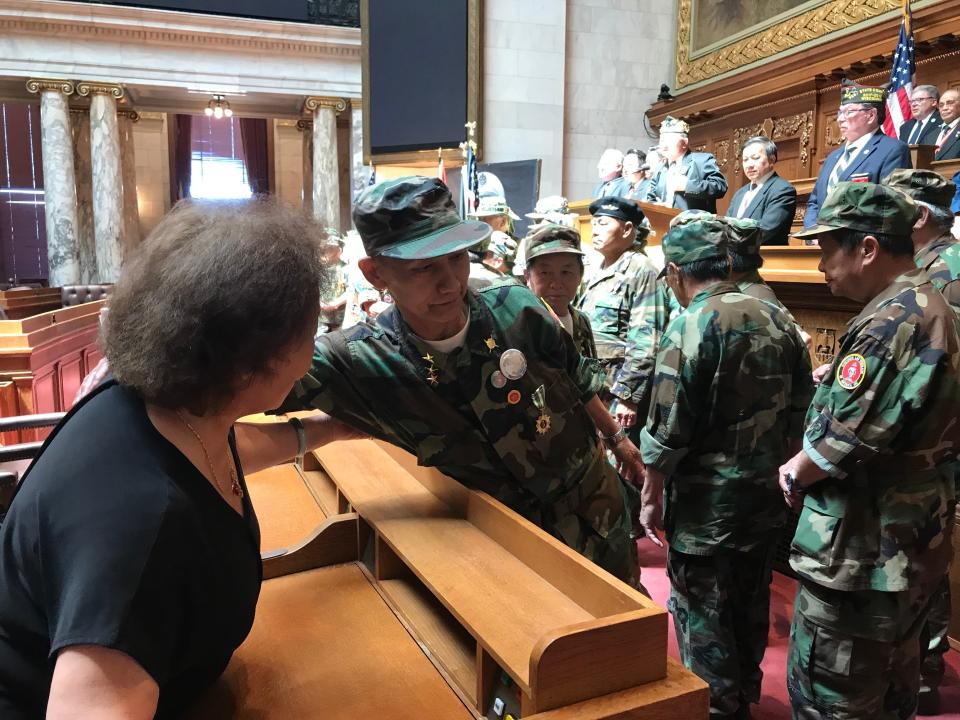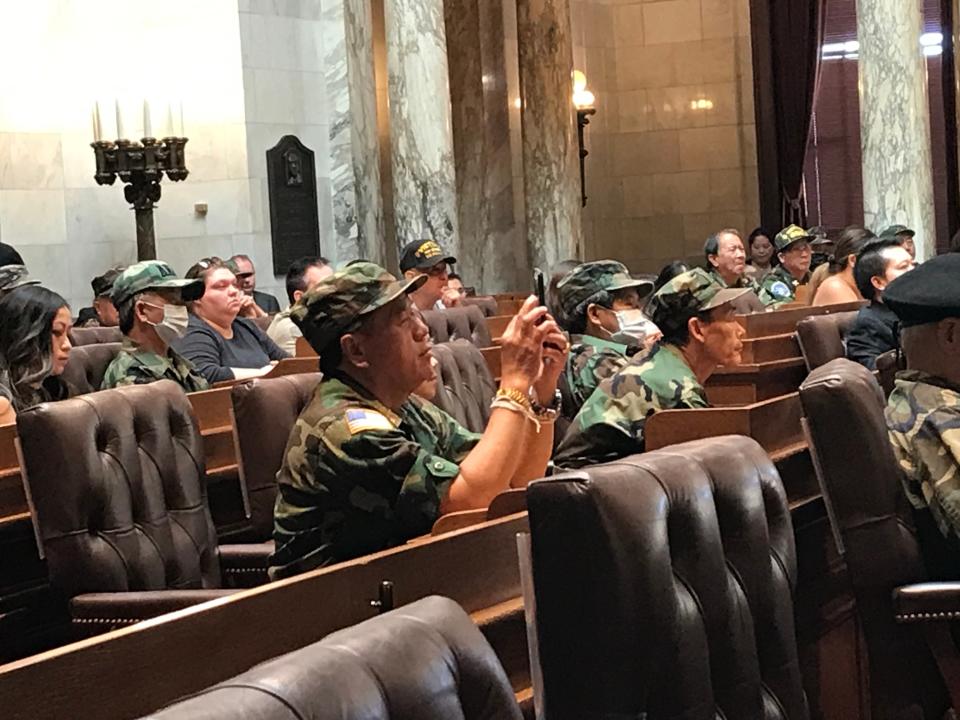‘I owe my life to you:’ Hmong veterans see recognition for service, but seek more awareness, benefits

Vietnam veteran John Schultz says he owes his life to the Hmong soldiers who fought alongside him.
A few months into his deployment to Vietnam, Schultz and the rest of his unit were sent on a mission near the Laos-Vietnam border, he said. The “unspoken” goal, unbeknownst to Schultz at the beginning, was to rescue U.S. pilots from a group of North Vietnamese travelling along the Ho Chi Minh trail on the Lao side of the border.
"We were not supposed to be there," said Schultz, now the past state commander of the Wisconsin Department of Veterans of Foreign Wars.
At their side were Hmong soldiers from Laos, allies of the United States. They could not have carried out the mission without them, and once they rescued the pilots, the Hmong led their American counterparts out of Laos and back to relative safety.
Before they went their separate ways, Schultz wanted to thank them. But they left before he got the chance. On Saturday, at a commemoration inside the state Capitol in Madison, he did not hesitate.
"To each and every one of you, Hmong-Lao veterans, I say, 'Thank you.' I owe my life to you," he said.
Last year, Gov. Tony Evers signed a law designating May 14 as Hmong-Lao Veterans Day, a day for recognizing Hmong veterans' contributions during the Secret War, a covert operation during the Vietnam War in. The CIA recruited Hmong people in Laos during the war to fight Communist forces.
"On Hmong-Lao Veterans Day, we join all Wisconsinites in honoring the sacrifices and service of the thousands of Hmong-Lao veterans who fought alongside the United States and recognize the many Hmong-Lao veterans who call Wisconsin home today," Evers said in a statement issued Friday.

Tens of thousands of Hmong soldiers died in the Secret War.
Laos fell under Communist control in 1975, and May 14 was the last day Hmong officers and others were airlifted to Thailand from the headquarters that had served as base for the covert CIA operation in Laos. Many Hmong who served in the Secret War were left behind and faced retribution from the new Communist regime they had resisted.
"When we lost to the Communists, ... they feel like they lost everything. Something like this is to make them feel like they are someone, they are recognized," said Zongsae Vang, a Hmong interpreter at the Capitol Saturday.
A few dozen Hmong veterans of the Secret War gathered in the Assembly chambers of the state Capitol Saturday, where a large portrait of their leader, the venerated Gen. Vang Pao, stood and the late general's youngest son, Chi Meng Vang, spoke. The gathering was organized by the Wisconsin Lao Veterans of America.
"We are all Americans today," Chi Meng said. "We all serve under one banner and that is the star-spangled banner."

Hmong veterans have long lobbied for more recognition by the U.S. government of their military contributions. The observance of Hmong-Lao Veterans Day, they say, is a step in the right direction.
There is more that they would like done, including on educating young people about Hmong history.
"Sooner or later, we're going to die. After we die, who's going to tell our history," Zongsae said.
Since the war, tens of thousands of Hmong people have resettled in the United States, with Wisconsin home to the third largest Hmong population of any state.
A bill introduced last year in the state Legislature to direct schools to teach about Hmong Americans did not make it out of committee or go to a vote. A bill that would expand most veterans benefits to Hmong people who served in the Secret War also was introduced last year but died in committee.
State Sen. Jerry Petrowski, R-Marathon, was a co-sponsor of the bill to name May 14 Hmong-Lao Veterans Day and told the Hmong veterans at the Capitol Saturday that the designation was a good start.
"There’s still a lot of things we would like to accomplish," he said.
As an example, Petrowski said he's hopeful state lawmakers will advance a bill in the next legislative session to allow Hmong veterans to be buried in Wisconsin veterans' cemeteries.
While Congress in 2018 passed a law allowing Hmong veterans of the Secret War to be buried in national cemeteries, Petrowski said changes need to be made to state law.
Chongjeh Vang, one of the veterans at the Capitol Saturday, served for nearly 15 years in the Secret War. He was 16 years old when he was recruited in 1961, he said. He trained Hmong soldiers in Thailand and also served at the Long Cheng airbase in northern Laos, directing aircraft, he said.
He was among the relatively few Hmong airlifted out of Laos to Thailand in May 1975. He stayed in Thailand until 1991, he said, waiting for friends and family who had been left behind in Laos.
He was happy to be with other veterans he had served with in Laos on Saturday, where they crowded around Chi Meng to pose for photos with him.
"Today is (an) important day that we have," he said.
Sarah Volpenhein is a Report for America corps reporter who focuses on news of value to underserved communities for the Milwaukee Journal Sentinel. Email her at svolpenhei@gannett.com. Please consider supporting journalism that informs our democracy with a tax-deductible gift to this reporting effort at JSOnline.com/RFA.
Our subscribers make this reporting possible. Please consider supporting local journalism by subscribing to the Journal Sentinel at jsonline.com/deal.
DOWNLOAD THE APP: Get the latest news, sports and more
This article originally appeared on Milwaukee Journal Sentinel: Hmong veterans honored for service, seek more awareness, benefits

 money
money 